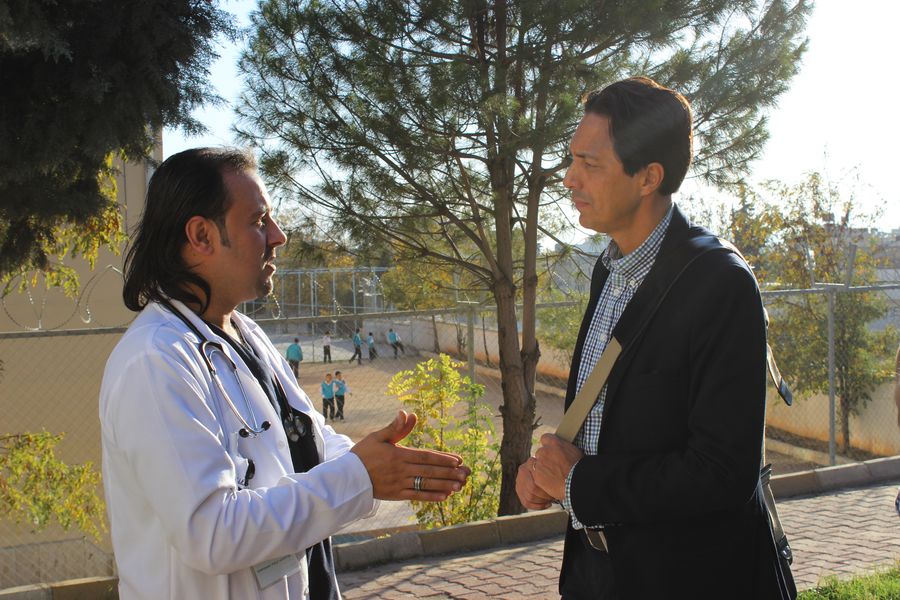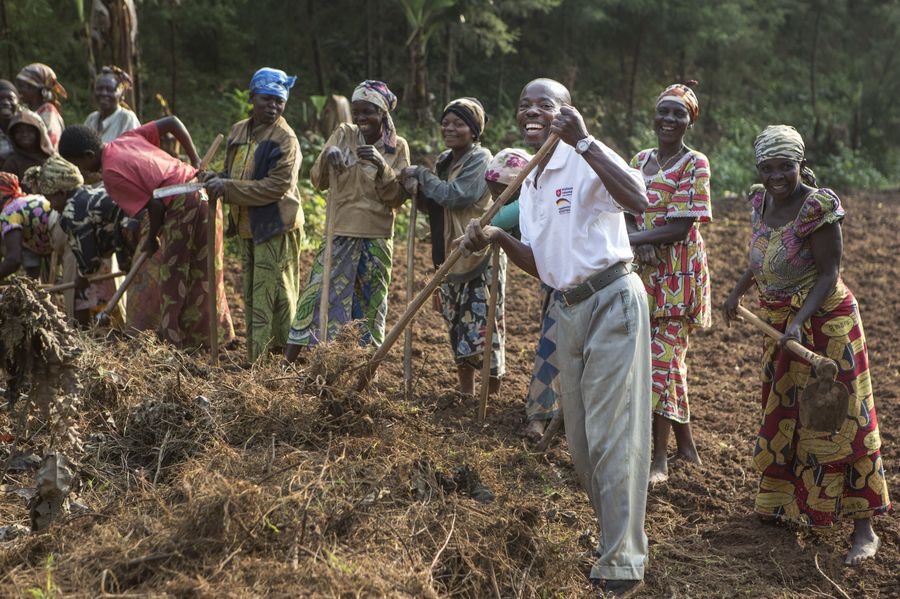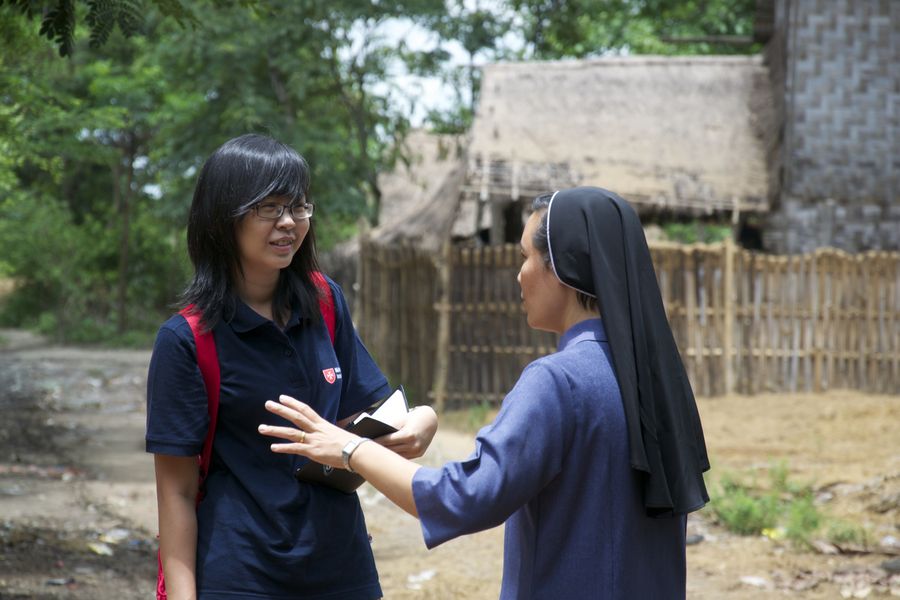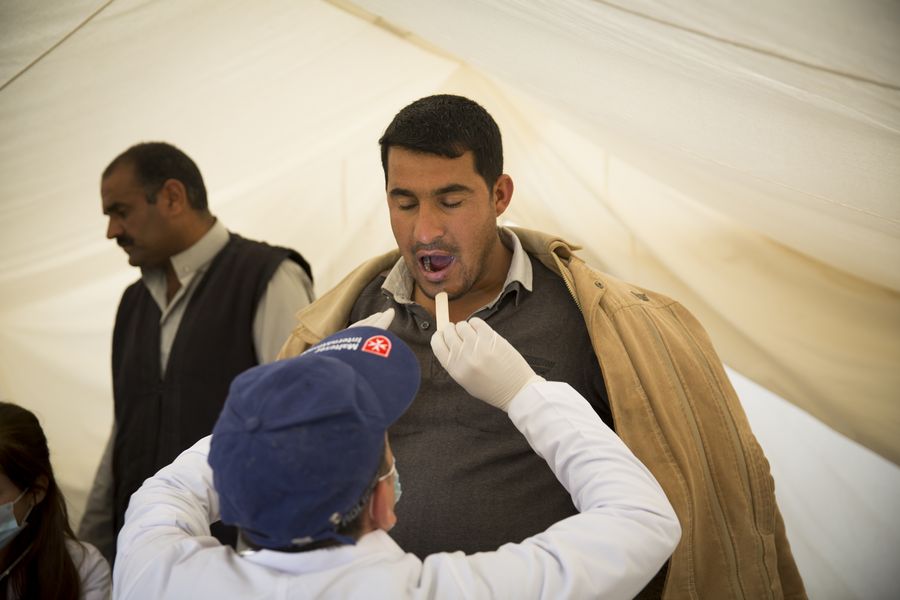"There is no point complaining about a lack of attention – we have to work intensively to improve the humanitarian system."
Interview with Sid Johann Peruvemba, Vice Secretary General and Program Director of Malteser International (until 2019)

The public image of humanitarian aid is characterized by immediate responses to crises, conflicts and natural disasters as they occur. Alongside these ongoing drams, many other ongoing crises fall out of the public consciousness and become forgotten. It is to forgotten crises such as these that the German Federal Foreign Office has dedicated its newest campaign. Vergessene humanitäre Kriesen – the campaign for forgotten humanitarian crises – was launched at the beginning of 2016 in cooperation with a variety of aid organizations. Malteser International’s Vice Secretary General and Program Director Sid Johan Peruvemba (until 2019) gave an interview on the questions of why some international crises become forgotten, and how we can develop solutions to this problem together.
Despite the ongoing need of many populations, some crises and conflicts that have been ongoing for several years slide out of the public consciousness. What are the reasons for this from your point of view?
It is not just crises and conflicts that become forgotten, but also people, events, themes and other elements from across the wide spectrum of what it means to be human become forgotten. This process of forgetting is not something that is unique to crises. Around the word, there are simply too many hotspots and regions of conflict. While some of them are more comprehensively depicted, the others suffer from neglect. Why is this? Is human suffering valued differently depending on where it takes place? The way that the media frames its reports, the way politicians react, the inequality in the response of donors or aid organizations could all certainly give that impression. But I am firmly convinced that people have a worldwide solidarity and willingness to help. Regardless of this solidarity, however, crises do receive an unequal response – because they are not treated the same way financially, because political responsibility for them is not taken seriously when states are not affected directly enough, and because a chronic and increasing underfunding of humanitarian activity means that most aid organizations are at the limits of their capacity.
What does that mean for people in crisis regions that are not on the public radar?
People in regions of forgotten crises suffer from a long-term lack of food, medication, education and other essentials. As the situation in Syria illustrates, however, such unmet demands also exist in crisis regions which are intensively covered in the media, and which take a central role in public discourse. The more forgotten a crisis is, however, the fewer prospects there are for long-term improvement. This seems to be the case, for example, with the Muslim Rohingya minority living in Myanmar. They are not officially recognized as a population group by the government, meaning that they are effectively stateless, and almost without rights: they cannot vote, they have no access to higher education, and they are unable to even leave the country through official channels. Of course, the future development of better known crises is also a big topic, and one might say that the best way of dealing with such events is to attempt to prevent them from happening in the first place.
In many ways, the international level of need for humanitarian aid is far beyond the capacities of the international community. What do you think are the dangers if these crises continue to be neglected in the way that they are currently?
Conflicts do not obey borders any more. When crises like those that we have at the moment continue to be ignored, then existing conflicts are going to increase in size, and cause other conflicts to arise. Violence, opposition, and death will spread, and peace will be ever more under threat. Some wars will even overtake us in Europe, as even more people attempt to flee here for safety. At the same time, we need to be conscious of the level of underfunding in humanitarian aid. Not one of even the heavily publicized crises is being funded sufficiently, and the resources of the organizations that are providing what aid is being given are limited.
Have the number and nature of forgotten crises improved of worsened in the last ten years? What is your impression?
From my point of view, the level of awareness about humanitarian crises has definitely improved in the last ten years. The development and spread of social media has contributed to this to an extent. Even when there is no uniform definition or assessment system for forgotten crises, there are a great deal of criteria that can contribute to our judgement. The European Union’s Humanitarian Aid and Civil Protection department (ECHO) identifies the most neglected crises through its annual Forgotten Crisis Assessment. This analysis takes into account criteria such as vulnerability, level of media coverage, as well as the existing aid that is being provided, as well as their own experiences and impressions. For example, Myanmar and Colombia have been included on this list, which normally includes between six and ten countries, for years. As a rule, it mainly includes the most fragile of states.

What do the international community, aid organizations, and society in general gave to do to save crises and conflicts from being forgotten, and to provide the aid that they need?
We need to work intensively on improving our analytical tools, the humanitarian system, and its financing so that crises are taken seriously at the right time, inequalities in responding to suffering can be avoided, and resources can be distributed more equally. It does not make any sense to complain about forgetfulness in itself.
At the same time, we have to realize that our way of looking at the world and its crises is often characterized by a certain eurocentrism. Governments and societies in Asia or the Americas have another point of view. That means that we have to scrutinize our role here in Europe. We do not have the competence to solve problems everywhere. If we put aside our Eurocentric point of view and look at the world in a polycentric way, local actors, partners and donors, with alternative perceptions and systems of value take on a much larger role. Many crises that we have ‘forgotten’ actually play a large role in local media output.
For Malteser International, engagement with forgotten crises is an aspect that deserves special attention. What are the challenges of this, and how do you proceed?
There are particular challenges with regard to the financing and programmatic approach of the aid we provide. Humanitarian organizations finance their work through donations – but it is significantly harder to ask donors to help in forgotten crises than in those that are present in the media. That is why unrestricted donations are so enormously important for our work – because they give aid organizations the ability to use funds where they are needed the most – including in those crisis regions that have been forgotten by the media and the public. Even the 90-95 per cent of funding that comes from public donors is often heavily focused on relatively high-profile topics.
As far as our programmatic approach is concerned, in many forgotten crises, such as in the DR Congo, or in Myanmar’s Rakhine State, we implement long-term structural development in close cooperation with local partners. That means that we have to be extremely careful with regard to the possible political implications of our actions, and make sure that we do not over time become merely an implementing agency of a dysfunctional state. In all crises – those that are forgotten, as well as those that are ongoing and very much present in the public mind – our concern is to reduce the vulnerability of the population, and to strengthen their resistance in the face disasters, crises and conflicts. This is an objective that needs aid projects designed for the long term. For example, we are one of the very few international aid organizations that is working in the Ituri Province of the DR Congo. From our point of view, this means that we are under a certain obligation to remain active there, and no to leave the people on their own.

Considering the insufficient resources of the international community, strengthening local partners has become an increasingly central concern of international aid. Why is cooperation with local organizations so important to Malteser International?
Local actors and partners are a pillar of our work. They are able to contribute an entirely different problem-solving competence than we are, because the know the country, the people and their needs much better. This is why there is an international initiative suggesting that in the future, up to 20 per cent of all funds should go from donors directly to local organizations, rather than via international aid agencies. In addition, our projects generally follow the humanitarian vision of ‘making yourself unnecessary’: we work constantly to improve the qualifications of our local partners so that they are eventually capable of carrying out their own aid projects.
Many crises are extremely protracted, and improvement is often barely in sight. In Colombia, for example, the population has been suffering from the effects of an armed conflict for around 50 years. Where do you get the motivation to continue to work for improvements in situations that often seem hopeless?
It motivates me to see that the humanitarian system and its analytical tools are constantly improving. Despite a certain slowness and rigidity to the system, there is a certain refreshing self-criticism amongst those of us engaged in humanitarian aid that means we are always on the lookout for new solutions. It is a pleasure to be engaged in this process. The understanding of their own role amongst aid workers has improved enormously in recent years. Instead of simply having the mentality of a ‘supplier’, there is now a very conscious mode of acting. My engagement with Malteser International as the international humanitarian aid organization of the Sovereign Order of Malta gives me the wonderful opportunity to cooperate in the further professionalization of the humanitarian system. But it also allows me to live out the importance that my faith gives to providing concrete support to one’s neighbors – and to bring harmony, as it were, to these two strands of my daily life.

Is there a crisis that concerns you in a deeply personal way, and if there is, why?
Yes – there are two categories of crisis in particular that I take a particularly strong personal interest. The first are those crises that take up a large part of my time professionally – such as the crisis in the Middle East, for example. Since as long ago as 2003, we have supported medical care for the local population in northern Iraq, and for more than 13 years now, we have been working with the same local partners – that means that I know a great number of people in the region, and I feel quite closely connected to it and to them. The second are those crises in which we are not really able to intervene. A good example of these would be the one in the Yemen at the moment. The suffering of the civilian population is almost unimaginable – but we have to deal with the terrible fact that it is simply not possible to gain access to the country at the moment. At the moment, we cannot help the people there.
The German Federal Foreign Office opened a campaign this year with the intention of increasing the public awareness of the problem of forgotten crises. Malteser International is taking part in this campaign together with other aid organizations. What hopes and expectations are involved in this campaign?
Malteser International is one of the organizations that have pushed the issue of forgotten crises to the fore in recent years, together with the Foreign Office, and its coordination committee for humanitarian aid. We are trying to take our concerns to the public through this campaign, in the hope that we will find supporters in the form of donors, taxpayers and decision makers, as well an increase in moral support. We do not want the campaign to make anybody feel guilty – we want it to improve the humanitarian aid system. All together, that means taking crises seriously when they need to be, mobilizing the public, and creating a functioning humanitarian system that appropriately strengthens local actors, and distributes our limited resources in a more equal manner. I am personally convinced that good ideas and the truth always win through. However, this is something that often needs a healthy dose of patience, and that is something that is unfortunately all too often lacking on my part.
Interview: Petra Ipp-Zavazal / Conor Heathcote (January 2016)








